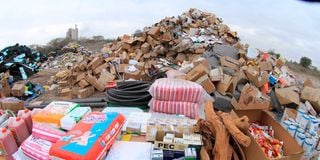Stop the counterfeit crisis, looming threat to society

Pile of counterfeit goods.
Kenya has faced myriad challenges in recent years in its sociopolitical landscape shaping. Yet a most troubling trend has emerged: Proliferation of counterfeit goods has infiltrated every aspect of daily life, threatening the integrity of the Kenyan economy and society.
The widespread availability of fake products poses a multifaceted threat with far-reaching consequences. It undermines consumer confidence, erodes trust in institutions and stifles economic growth. It poses significant health, safety and economic risks to unsuspecting consumers with counterfeit medicines, in particular, being a grave threat to public health.
One of the most worrying aspects of the counterfeit crisis is its pervasiveness. From bustling marketplaces to reputable retail outlets, counterfeits have found their way into the hands of unwitting consumers, often masquerading as genuine articles. This deceptive practice not only cheats consumers out of their hard-earned money but also deprives legitimate businesses of revenue, undercutting their ability to compete in the marketplace fairly.
Physical goods
The problem extends beyond physical goods to include documents and certificates, undermining the credibility of institutions and jeopardising the integrity of vital processes such as education, governance and commerce. Counterfeit academic certificates devalue legitimate qualifications, eroding trust in the education system and hindering opportunities for genuine students and jobseekers. Similarly, counterfeit government documents undermine the rule of law, impeding efforts to combat corruption and maintain public trust in state institutions.
Addressing the crisis requires a multifaceted approach encompassing stringent enforcement measures, public awareness campaigns and collaboration between government agencies, law enforcement bodies, industry stakeholders and civil society. Strengthening regulatory frameworks and enhancing surveillance mechanisms can help curb the production and distribution of counterfeits while robust enforcement actions must be taken against those involved in their production and trade.
Public education and awareness campaigns are essential to empower consumers to identify counterfeits and make informed purchasing decisions. By fostering a culture of vigilance and accountability, we can mitigate the spread of counterfeits and safeguard our health, safety and economic well-being.
Economic prosperity
The crisis presents a significant threat to economic prosperity, public health and societal integrity. Tackling it requires concerted efforts at the local, national and international levels to combat illicit trade, strengthen regulatory frameworks and empower consumers with the knowledge and tools to identify and avoid counterfeit products.
The assertion that “everybody in Kenya is fake” would be a sweeping generalisation that fails to capture the complexity and diversity of the society.
Within the vibrant tapestry of the society that is Kenya, home to over 50 million people from diverse ethnic, cultural and socioeconomic backgrounds, are individuals who exemplify integrity, honesty and authenticity in their actions and interactions.
To categorise all Kenyans as “fake” due to the actions of a few is to overlook the countless individuals who contribute positively to society, uphold moral values and strive for genuine progress and development.
Every society has its share of individuals who engage in deceitful or unethical behaviour. Attributing such behaviour to an entire population based on nationality or ethnicity is unjust and perpetuates harmful stereotypes.
Socioeconomic disparities, lack of access to quality education, and inadequate governance structures are among the factors that can create conditions conducive to fraud or corruption. Addressing these root causes requires targeted interventions and systemic reforms.
Moreover, it is essential to recognise the resilience, creativity and innovation that characterise many Kenyan communities. Despite numerous challenges, Kenyans have demonstrated remarkable resourcefulness and determination in overcoming adversity and driving positive change in their society.
Mr Mohamed is a sustainable and disruptive strategies expert. [email protected].





